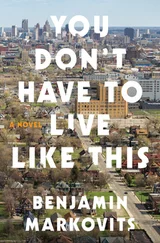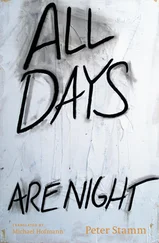“I’ve no idea how long it’ll be,” said Andreas.
“Doesn’t matter. I’ve got something to read.”
The operation itself didn’t take long, but afterward Andreas had to go and lie down for a couple of hours, even though he’d only been given a local anesthetic. When they told him he could go, he called Delphine. She said she’d be there in fifteen minutes. He was to wait for her at the entrance. He went out into the big hospital forecourt, ringed by three-story buildings of light-colored sandstone. The complex put him in mind of a barracks or prison. In the middle of the yard was a piece of lawn surrounded by a low hedge, at the far end of it was a tower with a clock. It was half past four. The yard was deserted, except for the occasional doctor or nurse crossing it with quick steps. It was astonishingly quiet, with no sense of the bustling city beyond.
Andreas tried to imagine what it would be like to have to spend weeks or months here, to have a bed behind one of the windows, and lie there weakened after an operation or a course of therapy. He would barely be able to take the few steps to the window, or out into the corridor. He was too weak to wish to be anywhere other than in bed, back in the semi-stupor in which he spent his nights and days. Then, in the middle of the night once, he found himself wide awake. He listened. It was raining outside, and the noise of the rain mingled with the sounds of his neighbor breathing. He got up and left the ward. He walked through darkened corridors and down wide staircases to the exit. He snuck past the porter, walked through the city, barefoot and in pajamas. Catch cold, he was thinking, catch my death of cold. Those strange sentences. A patrol car followed him for a while, but he slipped away through a pedestrian street.
Andreas emerged onto the street. A couple of tourists were hurriedly lugging big plastic suitcases across the road to the station. For a moment he thought of catching the next train, never mind where to, anywhere they wouldn’t be able to find him. He failed to spot Delphine, who was parked only a few yards away. She had to wind down the window and call his name. Delphine moved freely about the apartment, as if she had been there many times before. She made tea for Andreas. She found everything right away, the teabags, the teapot, the matches to light the gas.
Andreas, wearing pajamas, was lying down on the sofa. He felt freezing, though it wasn’t cold. Delphine brought him a blanket from the bedroom, and sat down in a chair opposite him. He smiled, and she furrowed her brow.
“What are you, my lover or my nurse?”
“I’m used to it,” she said. “My mother was often sick.”
Andreas was surprised his situation didn’t feel more awkward to him. When he’d been ill before, he would crawl into a corner, and refuse any offers of help or visits. Now, though, he was glad Delphine was with him, looking after him and talking to him.
“Was it very bad?”
“It didn’t hurt, and it doesn’t hurt now. But the idea of them cutting you open and shoving something inside you, that’s terrible.”
He said he didn’t want to talk about it now. He wanted to rest. Delphine asked him whether he would like her to read aloud to him. She went over to the bookshelf, and browsed through the titles.
“Jack London,” she said, “wasn’t he that gold miner? What are you in the mood for? Understanding Germany? Switzerland from the Air, The Judge and His Hangman? A Short Grammar of the German Language, Bertolt Brecht?”
She groaned.
“Can you read German?”
Delphine said she had taken it at school, but forgotten most of it. Andreas pointed her to the little book on the coffee table. That was fairly simple, he said, school level. Delphine worked out the title.
“Love Without Frontiers,” she said. “And you give that kind of thing to your kids?”
“No,” said Andreas, and shut his eyes. Delphine cleared her throat and began to read.
It was on a warm spring day that I saw Angélique for the first time. I knew right away that she wasn’t from here. She wore different clothes from the local girls. The girls here all go around in jeans. They ride bikes, and they talk as loudly as the boys. Angélique was wearing a skirt. She was walking through the village. She was carrying a shopping basket, and she was looking around curiously .
Delphine read softly and slowly. Sometimes she got her stresses so wrong that Andreas had to concentrate hard to follow the text. After a while he gave up the effort, and just followed the sound of her voice.
He tried to picture Fabienne walking in the village, but he couldn’t do it. He could barely remember her face. He saw Sylvie and Nadia and the teacher with the big breasts, and, when he briefly opened his eyes, Delphine, leaning over the book and slowly and with difficulty forming German sentences that she could probably not understand more than half of. He remembered the first lessons in the German book, the language tapes, the friendly detached voice speaking nonsensical sentences: The grass is green. The sky is blue. The pine is tall . And then the expectant silence that made the sentences into questions. Was the grass really green? Was the sky blue? And then the voice a second time, repeating the sentence. The grass was green, and the world was the way it had always been.
Andreas remembered meeting Fabienne for the first time. It was at a twentieth birthday party for Manuel’s sister Beatrice, with whom he went out later. At the time he barely knew Beatrice. He had met her a couple of times while doing homework with Manuel. Presumably she had invited him because of her brother, who didn’t have many friends. At the time, Fabienne was newly arrived in the village. He couldn’t remember where Beatrice knew her from.
The party was in a cottage in the woods. The woods were bordered on one side by industrial terrain and a gravel pit, but the hut was on the other, by the river. When Andreas arrived, there was a big fire already going. Young men and women stood around talking. He propped his bike against a tree, and watched as they went around getting things ready. Most of the guests he knew vaguely by sight. A couple of young men came out of the forest with huge bundles of wood, which they dropped on the ground beside the fire. Beatrice was peeling clingwrap off bowls of salad, and Manuel was pricking sausages. Fabienne caught Andreas’s eye right away. She never left Beatrice’s side.
After they had eaten, Beatrice unpacked the presents, and asked who each one was from, and thanked the people without looking at them properly. Andreas’s present was a book by Albert Camus that he had only recently read himself. The two young men who had brought the wood were now burning cardboard plates and napkins on the fire. Andreas watched as the laminated finish on the plates bubbled up before the plates suddenly caught fire and were consumed with a greenish flame in a matter of seconds.
A birthday cake was produced, and Beatrice and Fabienne pumped coffee from a giant thermos flask.
One of the young men had brought a guitar, and Christian songs were sung that Andreas didn’t know.
Time hurries by, the hours fly,
and no one stops them.
Your years too are rushing by
like a bird in flight .
Fabienne looked ravishing in the firelight. When their eyes met, she smiled. She seemed not to know the songs either.
Someone began telling jokes. Then Beatrice suggested playing hide and seek. Everyone paired off, and because most of the guests knew each other from the Christian youth group, and a few of them were couples already, at the end only Fabienne and Andreas were left over. Beatrice explained the rules, and told people not to go too far. She and her friend stayed by the fire, and started counting down.
Читать дальше












